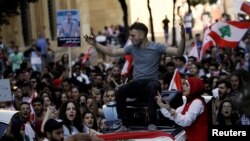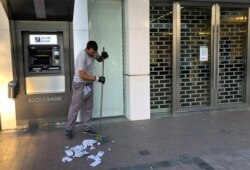Lebanon's banks and schools were shut on Tuesday in a new wave of disruption as politicians struggled to agree on a new government to steer the country out of its worst economic crisis since the 1975-90 civil war.
The top U.N. official in Lebanon called for the urgent formation of a cabinet made up of people known for their competence, which he said would be in a better position to appeal for international support.
"The financial and economic situation is critical, and the government and other authorities cannot wait any longer to start addressing it," the U.N. Special Coordinator for Lebanon, Jan Kubis, said after meeting President Michel Aoun along with a group of foreign ambassadors.
The country urgently needs a new government to enact emergency economic measures. The head of an importers' syndicate said restrictions on payments abroad were getting worse and further bank closures were not helping.
Aoun said formal consultations with MPs to nominate a new prime minister and form the cabinet would be held soon. Ahead of the formal discussions, politicians have been trying to agree on the composition of the government to replace caretaker Prime Minister Saad al-Hariri's outgoing cabinet.
Bank branches, which were closed for nearly half of October, shut again on fears for the safety of staff who have felt intimidated by customers demanding access to their money and protesters who have gathered at banks, a union leader said.
The demonstrations have been fueled by anger at the ruling elite, including several ageing former militia leaders, widely perceived to have overseen rampant state corruption for decades.
The economic crisis stems largely from a slowdown of capital inflows, which has led to a scarcity of U.S. dollars and generated a black market where the Lebanese pound has weakened below its official pegged rate.
A foreign exchange dealer said a dollar was costing 1,820 pounds on Tuesday, around the level cited on Friday when banks were last open and around 20% weaker than the official pegged rate of 1,507.5 pounds.
Sluggish economy
Since reopening on Nov. 1 after a two-week closure, banks have been seeking to prevent capital flight by imposing restrictions on dollar withdrawals and transfers abroad.
"We aim to meet with the Association of Banks in Lebanon today and decide how we're going to work together to solve this issue so that bank employees are not harassed," President of the Federation of Syndicates of Bank Employees George al-Hajj said.
ATM machines will be stocked so that depositors do not feel "punished" by the strike action, Hajj said.
Lebanon's central bank said on Monday that bank deposits were secure and it had the ability to preserve the stability of the pegged Lebanese pound.
Hani Bohsali, general manager of Bohsali Foods and president of the Syndicate of Importers of Foodstuffs, Consumer Products and Drinks, which represents around 50 importers, said while some shortages were being felt these were not yet "strategic.”
"There is a lack of outgoing transfers, so in return there is a lack of inflow of goods, and suppliers are now starting to hold shipments that have not been paid for," he said.
While some payments had been processed since banks reopened, he added: "The trend is negative, it is decreasing.”
'People are angry'
In a televised news conference, central bank governor Riad Salameh said on Monday capital controls were not on the table and there would be no haircut - or value-reduction – on deposits.
Schools were also closed on Tuesday, a decision the education minister announced because of calls for a wider strike and out of respect for "students' right to express their views.”
Protesters rallied in several towns and cities, and in Tripoli, they blocked the main highway linking the northern city, Lebanon's second biggest, to Beirut with burning tires.
"People are angry, the authorities colluded against us and are delaying us. They are not sympathizing with our feelings, nor our pain, nor with the time we are spending on the streets," said one of the protesters, Rabih al-Zein.
Kubis, the U.N. official, urged authorities to prioritize maintaining monetary and financial stability, including measures to give people confidence and protect their savings.






